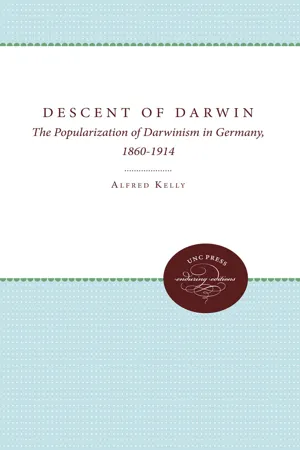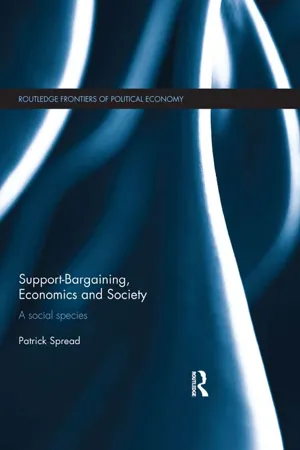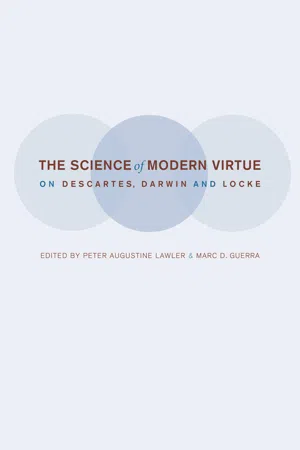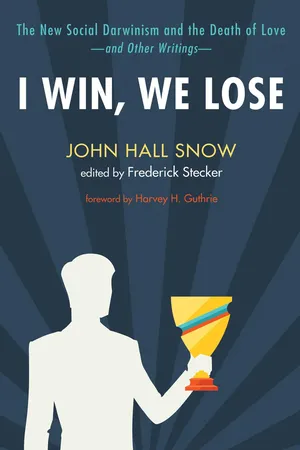History
Social Darwinism
Social Darwinism is a belief system that applies Charles Darwin's theory of natural selection to human societies. It suggests that certain groups or individuals are naturally superior to others and that this superiority justifies their dominance. This concept was used to justify imperialism, racism, and inequality, and it had a significant impact on social and political thought in the late 19th and early 20th centuries.
Written by Perlego with AI-assistance
Related key terms
6 Key excerpts on "Social Darwinism"
- eBook - ePub
- Michael Banton(Author)
- 2019(Publication Date)
- Routledge(Publisher)
5Social DarwinismBy Social Darwinism is meant the application to society of principles believed to have been established by Charles Darwin. For the present discussion its chief features are those that entailed a modification or outright reversal of the propositions of racial typology. The theory of types in its purest form stated that underlying the superficial variations in human constitutions there was a limited number of permanent types of distinct origin. Interbreeding had no effect as hybrid stocks were ultimately sterile. The diversity of human forms made this a difficult doc־ trine to defend, and most exponents admitted some possibilities of change. Their statements usually implied that there had been pure races in the past and that interbreeding was leading to degeneration. Several versions of the theory presented inter-racial antagonism as something bred into the nature of races, or at least of the successful races. Social Darwinism also saw relations between peoples of different races as biologically determined, but in a less mechanical way. In contrast to the pessimism of men like Gobineau, Darwinists thought that the operation of natural selection would create pure races out of the prevailing diversity; while many of them held that if eugenic measures were adopted biological change could be on the side of human progress.Like its predecessor, Social Darwinism denied the split between body and spirit crucial to Christian theology. Evolution offered, or appeared to offer, a physical cause explanation of everything in the human realm, including morals. The theory of natural selection exerted an immeasureable influence upon most aspects of early twentieth century thought. The basic concepts of Social Darwinism, as seen by one of its expositors (Chatterton-Hill, 1907: 3) were four. First, variability: no two living beings were alike. Species changed over time, so there were no permanent types. Second, heredity: an individual’s characters were not acquired by adaptation but inherited from his ancestor. This principie was regarded as limiting the power of an individual to achieve certain ends and as weakening the significance of moral causes in human affairs. Third, excessive fecundity: the demonstration that so many more organisms were generated than were necessary for the maintenance or even the expansion of the species damaged earlier notions of a divine economy in nature. Fourth, selection: the proposition that certain individuals because of accidental variation would be favoured by the selective process appeared to base evolution upon chance instead of supernatural design and was disturbing to those who thought in the old terms. Biological fitness was not judged in terms of merit but simply of success in leaving the most numerous progeny. - eBook - ePub
The Social Meaning of Modern Biology
From Social Darwinism to Sociobiology
- Howard Kaye(Author)
- 2017(Publication Date)
- Routledge(Publisher)
1979, p. 157), was the first of many to charge that Darwin's theory of evolution was largely a projection of bourgeois competitive relations onto the realm of nature. And the danger of such a projection has proved to be as clear to others as it was to Engels: the use of Darwinism as an ideological buttress for competitive capitalism, a tactic which soon came to be known as "Social Darwinism." Once the characteristics of bourgeois reality and of its ideological defenses have been transferred to nature, they are then, in Engels's words, "transferred back again from organic nature to history and it is now claimed that their validity as eternal laws of human society has been proved" (quoted in Sahlins 1976, pp. 102-03).To non-Marxists as well, the ideological elements in Darwin's work and the ideological uses to which it has been put have been obvious. As historian Richard Hofstadter noted in his influential Social Darwinism in American Thought, "a parallel can be drawn between the patterns of natural selection and classical economics," with the survival of the fittest a "biological generalization of the cruel processes which reflective observers saw at work in early nineteenth-century society" ([1944] 1955, pp. 38, 144). Armed with such a biological generalization, social Darwinists like Herbert Spencer and William Graham Sumner could provide what appeared to be the sanction of science and of the cosmos for these "cruel processes" in capitalist society.The question of Darwin's role in the development of Social Darwinism has continued to be debated, but the reality of Social Darwinism has largely gone unquestioned. The misapplication of the theories of natural selection and the struggle for existence to human society as a powerful and cruel apology for brutal exploitation both within and between societies is now "so well known," the historian of science Loren Graham tells us, "that it need not be discussed" (1981, p. 218). That it is so well known is in large measure due to Hofstadter's widely read work.3In Hofstadter's view, Social Darwinism was strongest in America because, "with its rapid expansion, its exploitative methods, its desperate competition, and its peremptory rejection of failure, post-bellum America was like a vast human caricature of the Darwinian struggle for existence and the survival of the fittest." In such a social jungle, "successful business entrepreneurs" turned to Darwinism "almost by instinct" in order to justify both their personal success and their ruthless methods. This conservative Social Darwinism served its ideological function well through the optimistic, expansionist decades of the 1870s and 1880s, during which the middle class could still believe in its opportunities for success in the struggle of life. But by the 1890s, Hofstadter claims, "the material basis of the Spencer-Sumner ideology was being transformed"; agrarian protests, labor struggles, and rapid urbanization had made the social environment appear too brutal to be tolerated. And with the concurrent growth of monopolies and loss of middle-class status and opportunities, the American middle class now "shrank from the principle it had glorified, turned in flight from the hideous image of rampant competitive brutality, and repudiated the once-heroic entrepreneur." Giving voice to such distress, American intellectuals began to work out a new "reform Darwinism," emphasizing the role of cooperation, intellect, and government intervention in achieving human progress. Thus for Hofstadter the story of Darwinism in America and the shift from conservative to reform varieties is the story of industrialization and serves as "a clear example of the principle that changes in the structure of social ideas wait on general changes in economic and political life" ([1944] 1955, pp. 5, 35, 38, 44, 119, 201—04; see also Bannister 1979, pp. 10, 136—37). - eBook - ePub
The Descent of Darwin
The Popularization of Darwinism in Germany, 1860-1914
- Alfred Kelly(Author)
- 2012(Publication Date)
- The University of North Carolina Press(Publisher)
Darwinism’s enormous popularity in the latter part of the nineteenth century was due in part to its apparent profound social and political implications. More than a biological theory for the specialists, Darwinism seemed, if only indirectly, to speak to the fundamental questions that lie at the heart of all social theory: What is man’s nature, and what is the natural order of human society? The desire to be on the side of nature—long a preoccupation of social theorists—tempted advocates of almost every cause to rummage among the rich ambiguities of evolutionary theory in the hope of uncovering scientific evidence in support of their views. Many capitalists, liberals, democrats, conservatives, nationalists, racists, and socialists convinced themselves that Darwinism could settle age-old controversies in their favor. And, in truth, almost anything could be inferred from Darwinism, provided that one was at once highly selective and oblivious to contradictory evidence. Apologists for capitalism, for instance, could glorify the struggle for life, while those pressing for radical egalitarianism could point to the common origin of all men or the natural necessity of change. That Darwin himself saw no broader social implications for his theories and was contemptuous of those who did, did nothing to still these often simplistic debates. In fact, Darwin’s failure to throw his immense prestige onto any one side probably contributed to the confusion and controversy. But, no matter how much he might share Darwin’s reluctance, no serious thinker or popularizer could hope to keep Darwinism confined to the realm of biology. Every Darwinist became ipso facto a social theorist.To oversimplify somewhat, there were two basic answers to the question, what does Darwinism mean for human society? The first stressed struggle and saw in Darwinism, with its natural selection of the fittest, proof of the naturalness (and hence justice) of the competitive, hierarchical, bourgeois society. In this view, the economic struggle had selected the fittest, who were now rich and powerful, and left the less fit behind. If the sufferings of the less fit masses were regrettable in the short term, they were nonetheless natural and necessary, and any attempt to alleviate them through social welfare would only contribute to the degeneration of the race. Carried to its logical extreme, and it often was, this interpretation of Darwinism could lead to eugenics or racial hygiene—attempts to “help” nature improve the race by speeding up natural selection in a desired direction. The second answer was given by socialists and radicals, who were never at ease with biological analogies to society, but still were able to find some comfort in Darwin’s implicit challenge to a static society. Accordingly, they saw change as the main message of Darwinism and stressed that existing elites were by no means the fittest in any Darwinian sense. Only when everyone had an equal start, as in nature, would men be able to reach their true potential. The term “Social Darwinism” has generally been associated with the first of these two positions and will be used that way here, but it may with almost equal justification be applied to the second. No one in the late nineteenth century called himself a Social Darwinist. The term is a creation of later historians, and its restricted application reflects more their interests and limitations than the merit of anyone’s special claim to Darwinism.1 - eBook - ePub
- Patrick Spread(Author)
- 2012(Publication Date)
- Routledge(Publisher)
20 But his approach to science suggests as much convenience as scientific concern. He had a vision of society and sought natural foundations on which to build it. His theory depended substantially for its popularity on the promise of progress and prosperity, at least for those with the fitness necessary to survival. The harsh consequences for the unfit ultimately brought about withdrawal of support for his theory. When it became clear that permissive entrepreneurship was not producing the changes in human nature that he foresaw, his theory lost credibility. Support instead assembled behind the ideal of a more group-conscious society that would share benefits more widely. The scientific underpinnings of Spencer's theory crumbled with the discrediting of Lamarck. Spencer suffered, like the theorists of cooperative social theory, from the inadequate foundations that natural science had been able to provide for social theory.Racism, imperialism and militarism
The regard for the ‘natural’ and violent aspects of the Darwinian struggle for existence meant that Darwin was potentially a very fertile source of theory in support of racism, imperialism and militarism. All three were burning issues in the period between the publication of the Origin and the outbreak of the First World War, so there was a demand for whatever light natural theorists could throw on the issues, with an implicit understanding that support would follow the light. Darwin's comments on race, quoted in Chapter 1 , and his anticipation in The Descent of Man that the civilised races would displace the savage races offered apparently straightforward support for adventurous imperialists. According to Hofstadter, Darwinism became, ‘…a new instrument in the hands of theorists of race and struggle’.21War was seen by many theorists as promoting the survival of the fittest and improvements to the race. It brought out noble qualities in humans, such as self-sacrifice and readiness to help others. At the outset of the First World War Sir Ronald Ross, professor of tropical medicine at the University of Liverpool, identified these effects of war. Paul Crook writes of Ross's theories: - eBook - ePub
The Science of Modern Virtue
On Descartes, Darwin, and Locke
- Peter Lawler, Marc Guerra(Authors)
- 2013(Publication Date)
- Northern Illinois University Press(Publisher)
The advent of Darwinian theory offered the first truly scientific study of what traits constitute human nature, as well as what traits might predictably differ across time, place, and culture. The science of human nature began to explain more about where humans came from and what their permanent, shared characteristics might be. Sadly, some used this new theory badly, making an argument that governmental control over evolution was necessary to prevent the pollution of the species with degenerate genes. The specter of eugenics has hung over us for the past hundred years, and it is important that we not forget those experiences.Social Darwinism used a faulty understanding of evolution to support massive government interference in individual lives, culminating in the mass sterilization and institutionalization of those suffering from what were actually complex social ills such as alcoholism and poverty. Assigning complex traits purely genetic causes meant that social planners no longer had to concern themselves with difficult political questions regarding justice, equity, and freedom. Instead, preventing the unfit from reproducing became a quick and easy way to create a utopian society.In the end, eugenical policies failed for both scientific and social reasons. The eugenicists’ understanding of Darwinian thought was flawed because it rested on a profound genetic determinism that failed to take into account environmental and social influences and the various ways genes interact with the environment and each other. Genetically improving the population ended up being as complex and difficult a task as effecting social and political change. Perhaps more importantly, the eugenics movement violated the moral sense of many people; this moral sense became stronger over time as the abuses of the eugenics movement became more apparent, and we now have a healthy—if not perhaps overly strong—sus picion of biological explanations of political phenomena.While the suspicion of government-run eugenics programs is well deserved, we must also recognize that Darwinian explanations are no less powerful because they have been used poorly before. In fact, Darwinian explanations of human behavior actually support the rejection of those early eugenical policies. The early eugenicists’ understanding of both evolution and human nature was facile and incomplete. A true Darwinian science of politics will take cues from the Aristotelian approach as well as from thinkers such as Smith and Montesquieu. It will not be the mere study of institutions but instead the complex study of biological, moral, and political explanations for social behavior. None of these explanations can operate without the others. - eBook - ePub
I Win, We Lose
The New Social Darwinism and the Death of Love and Other Writings
- Snow, Stecker(Authors)
- 2016(Publication Date)
- Wipf and Stock(Publisher)
They are, however, as impressed as any other American with the idea of survival of the fittest. It was Social Darwinism that made tokenism such an effective device in keeping American blacks an underclass precisely because it is not a conspiracy, but a shared tacit assumption about the nature of reality, shared by both blacks and whites. Success is heavy stuff. Knowing that one has proved one’s “fitness” to survive makes one vulnerable to the manipulation of those who have defined what fitness is. Those blacks who played the game strictly according to the rules with superb kinetic intelligence, those blacks who became officers in both World Wars moved from there into civil service, those blacks who got through college on the GI Bill of Rights and worked their way into professions, or the black insurance business or by whatever means into the middle class, those blacks who became well-paid entertainers, or the top athletes of the nation, all found it difficult not to ask the Social Darwinist question, “Why me?” White people were quick to give an answer that confirmed themselves, “Because you’re more like us, because you’re better fit to survive. If they were more like you, they wouldn’t be inept and poor. In this country everybody has equal access to the top. Look at you. Nobody kept you from getting to the top.” The black middle class knew better. They knew that from their birth, their rise to the top had not quite been like the upward mobility of most whites. It had been more like an obstacle course than a ladder. They had to have been three times more capable at everything than their white competitors. More of everything had been required of them: more energy, more work, more tact, more talent, more patriotism, and more morality. But there was still certain logic to the Social Darwinist argument
Learn about this page
Index pages curate the most relevant extracts from our library of academic textbooks. They’ve been created using an in-house natural language model (NLM), each adding context and meaning to key research topics.





